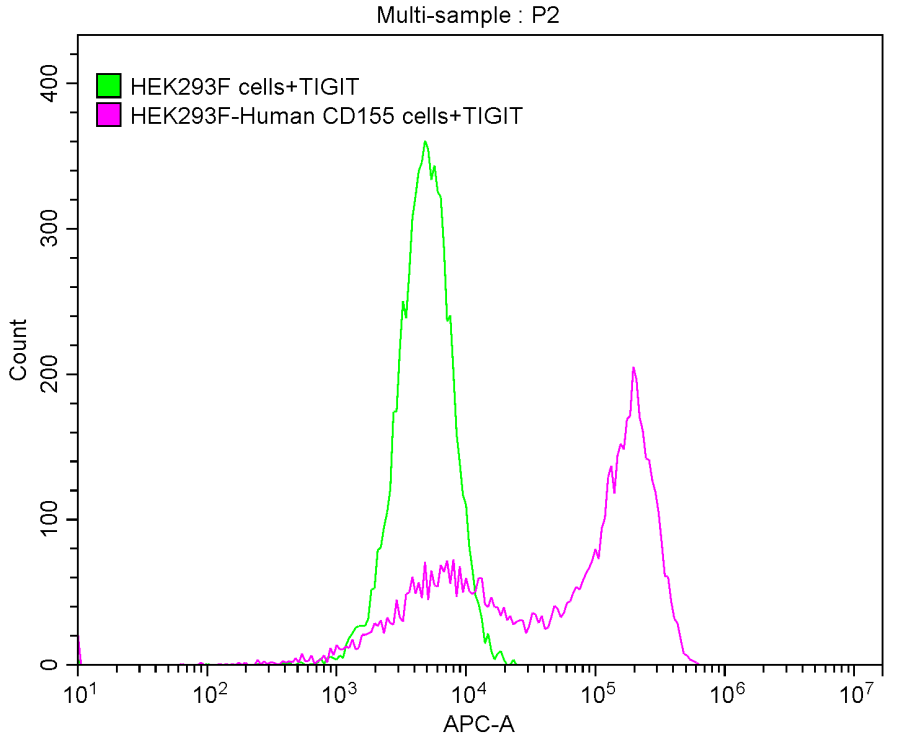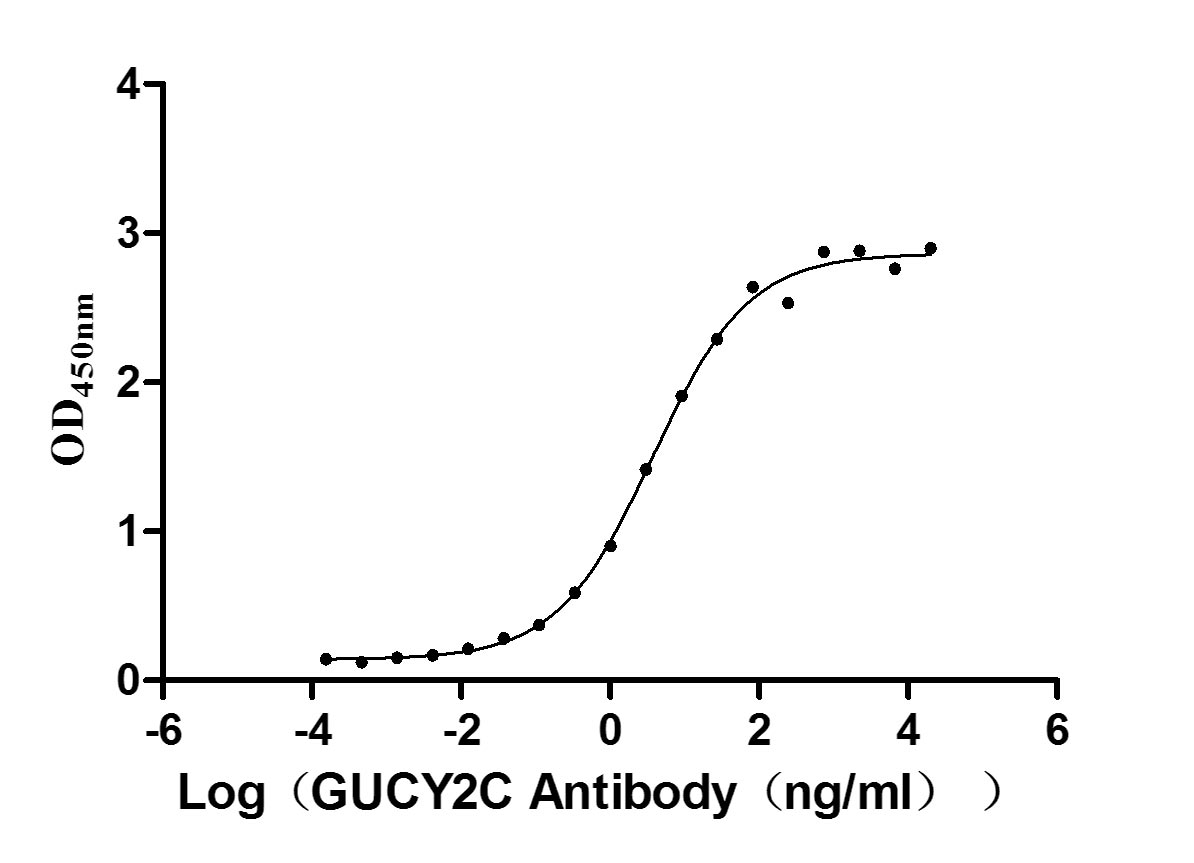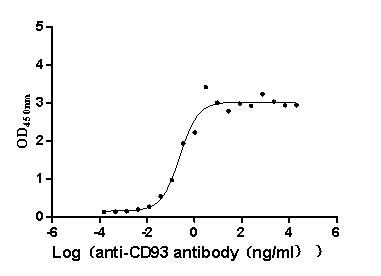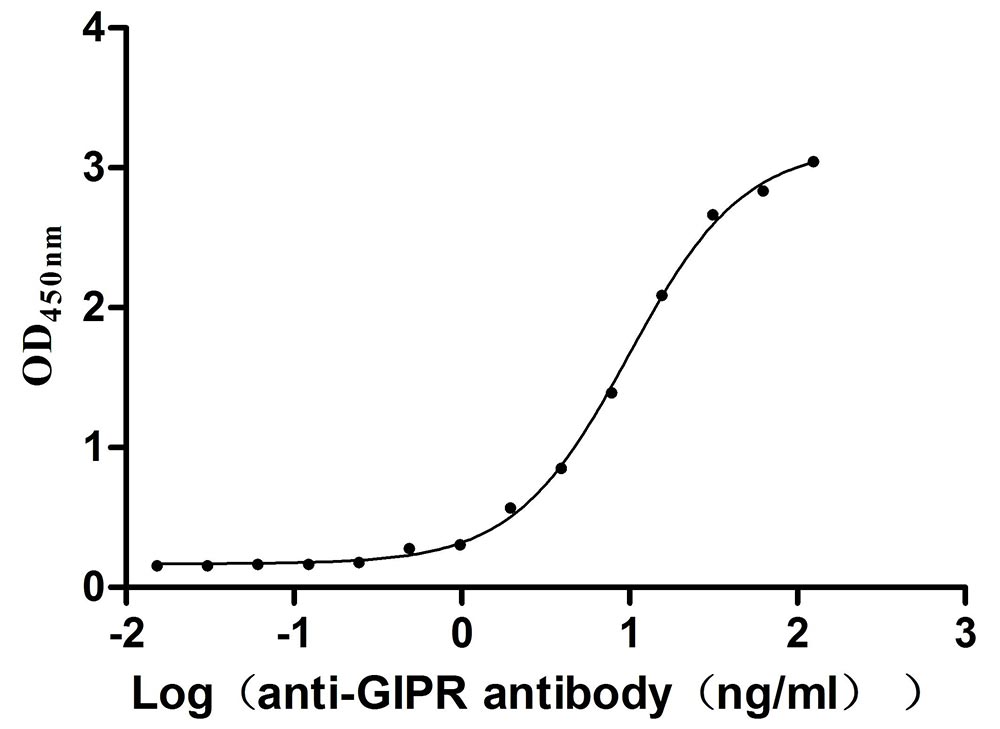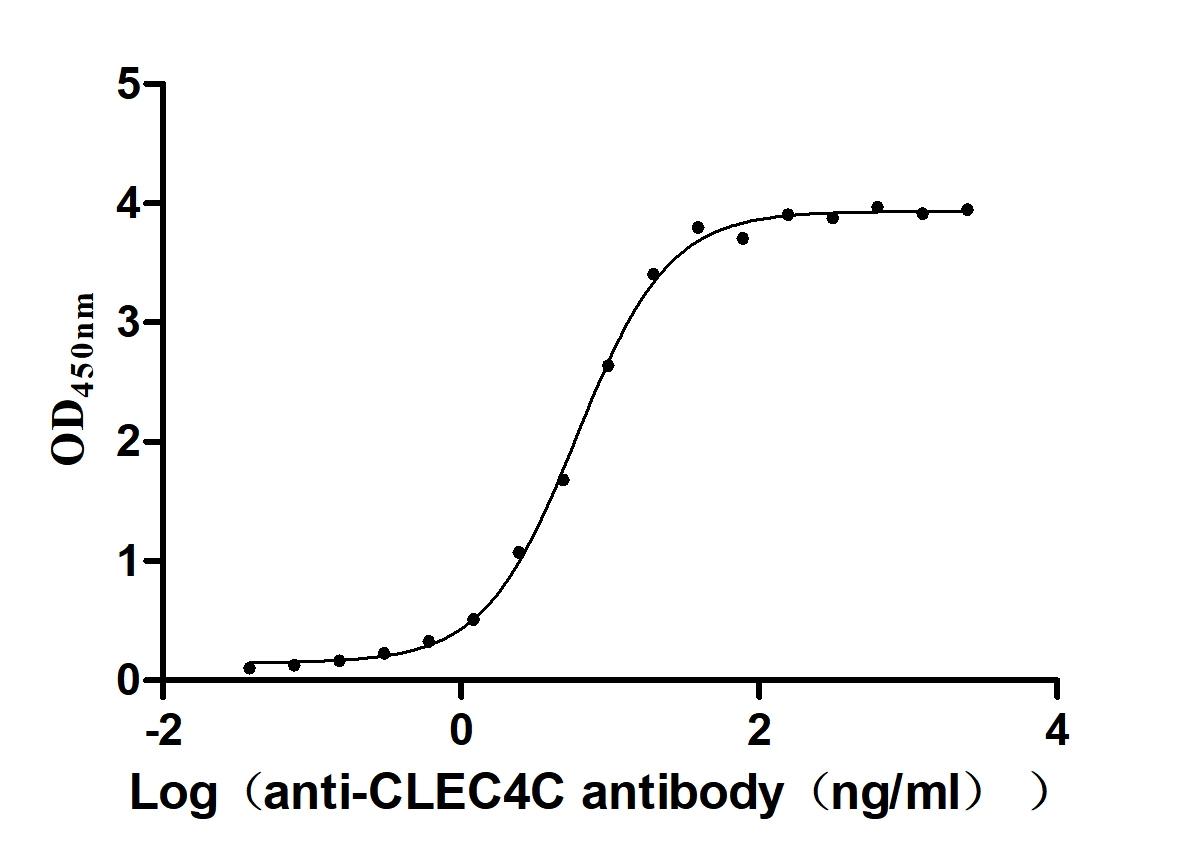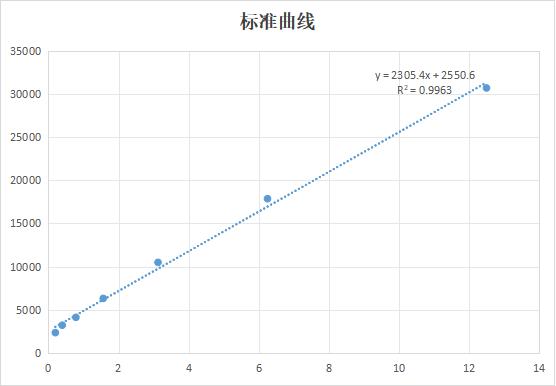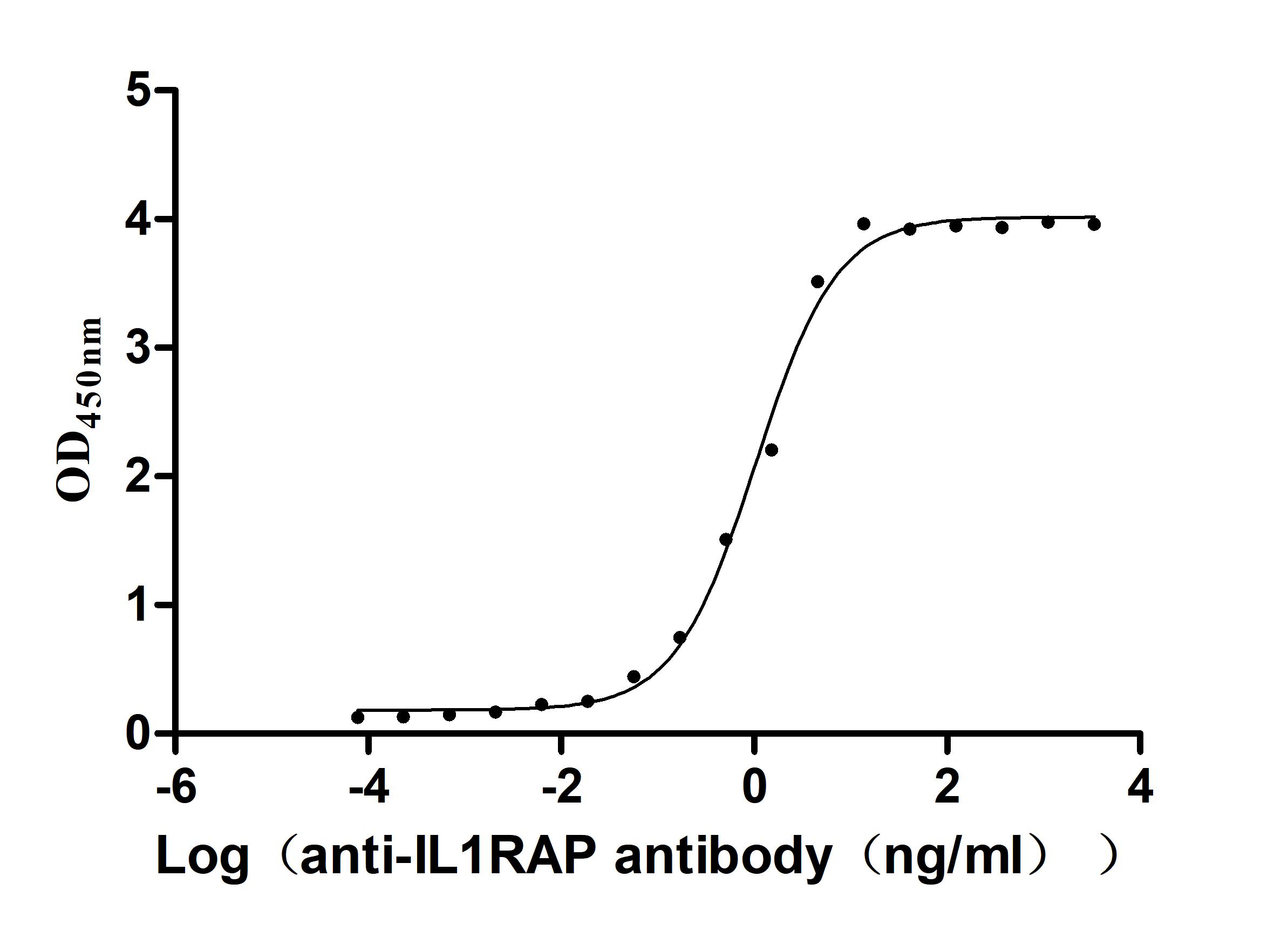Recombinant Human Mothers against decapentaplegic homolog 7 (SMAD7)
-
货号:CSB-YP021793HU
-
规格:
-
来源:Yeast
-
其他:
-
货号:CSB-EP021793HU
-
规格:
-
来源:E.coli
-
其他:
-
货号:CSB-EP021793HU-B
-
规格:
-
来源:E.coli
-
共轭:Avi-tag Biotinylated
E. coli biotin ligase (BirA) is highly specific in covalently attaching biotin to the 15 amino acid AviTag peptide. This recombinant protein was biotinylated in vivo by AviTag-BirA technology, which method is BriA catalyzes amide linkage between the biotin and the specific lysine of the AviTag.
-
其他:
-
货号:CSB-BP021793HU
-
规格:
-
来源:Baculovirus
-
其他:
-
货号:CSB-MP021793HU
-
规格:
-
来源:Mammalian cell
-
其他:
产品详情
-
纯度:>85% (SDS-PAGE)
-
基因名:
-
Uniprot No.:
-
别名:CRCS3; FLJ16482; hSMAD 7; hSMAD7; MAD (mothers against decapentaplegic Drosophila) homolog 7; MAD; Mad homolog 7; MAD homolog 8; MAD mothers against decapentaplegic homolog 7; MADH 7; MADH 8; MADH6; MADH7; MADH8; Mothers Against Decapentaplegic Drosophila Homolog of 6; Mothers Against Decapentaplegic Drosophila Homolog of 7; Mothers against decapentaplegic homolog 7; Mothers against decapentaplegic homolog 8; Mothers against DPP homolog 7; Mothers against DPP homolog 8; SMA- AND MAD-RELATED PROTEIN 7; SMAD 7; SMAD; SMAD family member 7; SMAD, mothers against DPP homolog 7 (Drosophila); SMAD, mothers against DPP homolog 7; SMAD6; Smad7; SMAD7_HUMAN
-
种属:Homo sapiens (Human)
-
蛋白长度:Full length protein
-
表达区域:1-426
-
氨基酸序列MFRTKRSALV RRLWRSRAPG GEDEEEGAGG GGGGGELRGE GATDSRAHGA GGGGPGRAGC CLGKAVRGAK GHHHPHPPAA GAGAAGGAEA DLKALTHSVL KKLKERQLEL LLQAVESRGG TRTACLLLPG RLDCRLGPGA PAGAQPAQPP SSYSLPLLLC KVFRWPDLRH SSEVKRLCCC ESYGKINPEL VCCNPHHLSR LCELESPPPP YSRYPMDFLK PTADCPDAVP SSAETGGTNY LAPGGLSDSQ LLLEPGDRSH WCVVAYWEEK TRVGRLYCVQ EPSLDIFYDL PQGNGFCLGQ LNSDNKSQLV QKVRSKIGCG IQLTREVDGV WVYNRSSYPI FIKSATLDNP DSRTLLVHKV FPGFSIKAFD YEKAYSLQRP NDHEFMQQPW TGFTVQISFV KGWGQCYTRQ FISSCPCWLE VIFNSR
-
蛋白标签:Tag type will be determined during the manufacturing process.
The tag type will be determined during production process. If you have specified tag type, please tell us and we will develop the specified tag preferentially. -
产品提供形式:Lyophilized powder
Note: We will preferentially ship the format that we have in stock, however, if you have any special requirement for the format, please remark your requirement when placing the order, we will prepare according to your demand. -
复溶:We recommend that this vial be briefly centrifuged prior to opening to bring the contents to the bottom. Please reconstitute protein in deionized sterile water to a concentration of 0.1-1.0 mg/mL.We recommend to add 5-50% of glycerol (final concentration) and aliquot for long-term storage at -20℃/-80℃. Our default final concentration of glycerol is 50%. Customers could use it as reference.
-
储存条件:Store at -20°C/-80°C upon receipt, aliquoting is necessary for mutiple use. Avoid repeated freeze-thaw cycles.
-
保质期:The shelf life is related to many factors, storage state, buffer ingredients, storage temperature and the stability of the protein itself.
Generally, the shelf life of liquid form is 6 months at -20°C/-80°C. The shelf life of lyophilized form is 12 months at -20°C/-80°C. -
货期:Delivery time may differ from different purchasing way or location, please kindly consult your local distributors for specific delivery time.Note: All of our proteins are default shipped with normal blue ice packs, if you request to ship with dry ice, please communicate with us in advance and extra fees will be charged.
-
注意事项:Repeated freezing and thawing is not recommended. Store working aliquots at 4°C for up to one week.
-
Datasheet :Please contact us to get it.
相关产品
靶点详情
-
功能:Antagonist of signaling by TGF-beta (transforming growth factor) type 1 receptor superfamily members; has been shown to inhibit TGF-beta (Transforming growth factor) and activin signaling by associating with their receptors thus preventing SMAD2 access. Functions as an adapter to recruit SMURF2 to the TGF-beta receptor complex. Also acts by recruiting the PPP1R15A-PP1 complex to TGFBR1, which promotes its dephosphorylation. Positively regulates PDPK1 kinase activity by stimulating its dissociation from the 14-3-3 protein YWHAQ which acts as a negative regulator.
-
基因功能参考文献:
- Expression of Smad7 was negatively regulated by miR-17-5p; Smad7 expression inactivated NF-kappaB and Wnt/beta catenin pathways. PMID: 29433423
- SMAD7 Polymorphisms Are Associated with Colorectal Cancer in Patients with Lynch Syndrome. PMID: 30275229
- OTU deubiquitinase 1 (OTUD1) directly deubiquitinates Smad7 Protein (SMAD7) and prevents its degradation. PMID: 29235476
- Periostin contributes to skin fibrosis by enhancing TGF-beta signaling via Smad 7 inhibition, which may lead to extracellular matrix deposition and periostin generation. PMID: 29433908
- HO-1 plays a key role in protecting tumor cells from apoptosis, in a process that involves Smad7 and HDAC4/5 in apoptosis of B-ALL cells PMID: 29886060
- Mechanistic studies reveal that TGFbeta activates the expression of microRNA-182 (miR-182), which suppresses SMAD7 protein. miR-182 silencing leads to SMAD7 upregulation on TGFbeta treatment and prevents TGFbeta-induced epithelial-mesenchymal transition and invasion of cancer cells. PMID: 27996004
- This study reports a proinflammatory role for SMAD7 in human gestational tissues, with SMAD7 silencing attenuating the inflammatory response. PMID: 29044425
- Smad7 enables STAT3 activation and promotes pluripotency independent of TGF-beta signaling. PMID: 28874583
- Studied expression of microRNA-375 and its target gene SMAD-7 polymorphisms (rs4939827) in colorectal cancer (CRC) patients in comparison to control subjects. A very significant correlation was found between miRNA-375 level and mutant and heterozygotes genotypes of SMAD-7 rs4939827 polymorphism in CRC. PMID: 28374902
- Studies indicate that the T allele of SMAD7 protein (SMAD7)single nucleotide polymorphism rs4939827 to be significantly related with an increase colorectal cancer (CRC) risk in Chinese population [Meta-analysis]. PMID: 28467803
- this large-scale meta-analysis indicated that SMAD7 polymorphisms (rs4464148, rs4939827, and rs12953717) correlate with CRC. PMID: 28070019
- Collectively, these findings demonstrate that the miR-15a/Smad-7/TGF-beta pathway is important in HBV-associated liver cancer. PMID: 28498453
- SMAD7 promoter is hyper-methylated both in human atherosclerotic plaques and atherosclerosis patients, which is positively associated with homocysteine levels and carotid plaque scores. PMID: 29366786
- Furthermore, MERS coronavirus induced apoptosis through upregulation of Smad7 and fibroblast growth factor 2 (FGF2) expression in both kidney and lung cells. PMID: 27572168
- findings demonstrate TGF-beta enhances expression of USP26 and reinforces SMAD7 stability by limiting the ubiquitin-mediated turnover of SMAD7; clinically, loss of USP26 correlates with high TGF-beta activity and confers poor prognosis in glioblastoma; data identify USP26 as a novel negative regulator of the TGF-beta pathway and suggest that loss of USP26 expression may be an important factor in glioblastoma pathogenesis PMID: 28381482
- In conclusion, our study demonstrated that COL1A2-AS1/miR-21/Smad pathway plays an important role in inhibiting hypertrophic scar formation, and suggested this novel pathway may be a new target for hypertrophic scar treatment. PMID: 29117538
- Our data revealed the SMAD7 loci is associated with hepatocellular carcinoma susceptibility and its clinicopathologic development. PMID: 26989026
- Smad7 expression in necrotizing enterocolitis macrophages interrupts TGF-beta signaling and promotes NF-kappaB-mediated inflammatory signaling in these cells through increased expression of IKK-beta PMID: 26859364
- SMAD7 gene and specifically the allele C could be protective for colorectal cancer (CRC). An independent protective association was also observed between high adherence Mediterranean diet pattern and CRC risk. PMID: 29084532
- Smad7 inhibition diminishes interaction of PKR with protein kinase inhibitor p58 (p58(IPK)). PMID: 28300830
- Smad7 regulates TGF-beta1 signaling via a negative feedback loop and mediates the interaction between TGF-beta1 and other signaling pathways; suggesting that Smad7 over expression may have therapeutic potential in ALL. PMID: 28732737
- Missense variant in smad7 gene is associated with colorectal cancer. PMID: 28218435
- ASPP2 suppresses invasion, peritoneal dissemination and TGF-beta1-induced EMT by inhibiting Smad7 degradation mediated by ITCH in gastric cancer cells. PMID: 28400336
- Transforming Growth Factor beta inhibitor peptide P144 downregulates SKI and an upregulates SMAD7 at both transcriptional and translational levels in glioblastoma cell lines. PMID: 27473823
- The inverse correlation between Smad7 and AhR expression helps to propagate inflammatory signals in the gut in Crohn's disease. PMID: 26818761
- RNF11 sequestration of the E3 ligase SMURF2 on membranes antagonizes SMAD7 down-regulation of transforming growth factor beta signaling PMID: 28292929
- NR2F2 could promote TGF-beta-induced epithelial-mesenchymal transition of colorectal carcinoma cells and inhibit Smad7 expression via transactivation of miR-21. PMID: 28192117
- this study shows that in refractory celiac disease, high Smad7 associates with defective TGF-beta1 signaling and sustains inflammatory cytokine production PMID: 27861825
- miR-590-5p promotes osteoblast differentiation by indirectly protecting and stabilizing the Runx2 protein by targeting Smad7 gene expression. PMID: 27192628
- miRNA-181a appears to play a potential role in pancreatic beta-cells dysfunction via SMAD7. PMID: 26892629
- Carboplatin may upregulate SMAD7 through suppression of miR-21 to inhibit TGFbeta receptor signaling mediated non-small cell lung cancer cell invasion. PMID: 27185036
- Downregulation of Smad 7 promotes migration and invasion through enhancing epithelial mesenchymal transition in esophageal squamous cell carcinoma. PMID: 27619676
- miR-424-5p -SMAD7 pathway contributed to esophageal squamous cell carcinoma invasion and metastasis. PMID: 27628042
- Polymorphisms in the SMAD7 rs4939827 is associated with rectal cancer. PMID: 26779637
- microRNA-497 modulates breast cancer cell proliferation, invasion, and survival by targeting SMAD7. PMID: 27303812
- SMAD7 overexpression might represent a mechanism limiting TGF-beta-mediated fibrogenesis in human hepatic diseases; therefore, SMAD7 induction likely represents a candidate for novel therapeutic approaches. PMID: 26856334
- Data show that protein kinase LKB1 physically interacts with BMP type I receptors and requires Smad7 protein to promote downregulation of the receptor. PMID: 26701726
- Study founds the levels of CYLD and SMAD7 significantly decreased in oral squamous cell carcinoma (OSSC) cells and proposes a model that CYLD suppresses OSCC metastases through SMAD7. Downregulation of CYLD appears to directly contribute to the distal metastases of primary OSCC and subsequently poor prognosis. PMID: 26982322
- Data indicate that, in irritable bowel disease, high Smad7 contributes to sustain detrimental immune responses and knockdown of this molecule can help attenuate the ongoing mucosal inflammation in patients with such disorders PMID: 26651974
- Results showed that SMAD7 was up-regulated in hepatocellular carcinoma tissues and was found to be the target of UPF1. PMID: 26759305
- The expression of Smad7 increased. PMID: 26278416
- MiR-185-3p and miR-324-3p can modulate NPC cell growth and apoptosis, at least partly through targeting SMAD7. PMID: 26390174
- Meta-analysis showed that for SMAD7 gene, rs4939827 and rs4464148 are risk factors for colorectal cancer (CRC) among Caucasians whereas rs12953717 could elevate the susceptibility to CRC in both Caucasians and Asians. PMID: 26579801
- The decrease in miR-195 led to an increase in Smad7 expression and corresponding up-regulation of p65 and the AP-1 (activator protein 1) pathway, which might explain the mechanism of steroid resistance in ulcerative colitis patients PMID: 26303523
- Increased miR-16 expression promotes liver fibrosis through downregulation of HGF and Smad7 in hepatitis C patients. PMID: 26071245
- miR-181a promotes TGF-beta-mediated epithelial-to-mesenchymal transition via repression of Smad7. PMID: 24394555
- Results suggest that Itch is a positive regulator of the TGF-beta-mediated Smad signaling pathway via Smad7 ubiquitination and protein degradation. PMID: 25518932
- Overexpression of Smad7 in human HaCaT keratinocyte cells and mouse skin tissues elevated EGF receptor (EGFR) activity by impairing ligand-induced ubiquitination and degradation of activated receptor, which is induced by the E3 ubiquitin ligase c-Cbl. PMID: 26055326
- The study found a significant association between colorectal cancer risk and rs4464148 AG genotype of the SMAD7 gene in affected women, but did not detect the same association in colorectal cancer male patients. PMID: 25640388
- SMAD7 is a target of miR-132 in glioma cells. PMID: 25983322
显示更多
收起更多
-
相关疾病:Colorectal cancer 3 (CRCS3)
-
亚细胞定位:Nucleus. Cytoplasm.
-
蛋白家族:Dwarfin/SMAD family
-
组织特异性:Ubiquitous with higher expression in the lung and vascular endothelium.
-
数据库链接:
HGNC: 6773
OMIM: 602932
KEGG: hsa:4092
STRING: 9606.ENSP00000262158
UniGene: Hs.465087
Most popular with customers
-
Recombinant Human T-cell immunoreceptor with Ig and ITIM domains (TIGIT), partial (Active)
Express system: Mammalian cell
Species: Homo sapiens (Human)
-
Recombinant Human Heat-stable enterotoxin receptor (GUCY2C), partial (Active)
Express system: Mammalian cell
Species: Homo sapiens (Human)
-
Recombinant Macaca fascicularis CD93 molecule (CD93), partial (Active)
Express system: Mammalian cell
Species: Macaca fascicularis (Crab-eating macaque) (Cynomolgus monkey)
-
Recombinant Mouse Gastric inhibitory polypeptide receptor (Gipr), partial (Active)
Express system: Mammalian cell
Species: Mus musculus (Mouse)
-
Recombinant Macaca fascicularis C-type lectin domain family 4 member C(CLEC4C), partial (Active)
Express system: Mammalian cell
Species: Macaca fascicularis (Crab-eating macaque) (Cynomolgus monkey)
-
Recombinant Human Urokinase-type plasminogen activator(PLAU) (Active)
Express system: Mammalian cell
Species: Homo sapiens (Human)
-
Recombinant Macaca fascicularis Interleukin 1 receptor accessory protein(IL1RAP), partial (Active)
Express system: Mammalian cell
Species: Macaca fascicularis (Crab-eating macaque) (Cynomolgus monkey)


